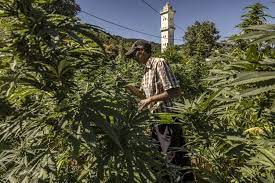The potential of the European cannabis market could bring between 420 and 630 million dollars to the North African country.
Morocco has announced an ambitious project to turn the cannabis sector into a major source of economic development for the country. The initiative involves the construction of cannabis processing plants in the provinces of Chefchaouen, Taounate and Al-Hoceima, regions historically known for their production of the plant.
These facilities, each with a surface area of 600 square metres, will be equipped with modern infrastructure to manage the entire production process, from the receipt of raw materials to the storage of finished products. The main objective is to produce cannabidiol, a non-psychoactive substance used in the pharmaceutical and cosmetic industries.
Each facility will include several specialised areas for the extraction, separation, purification, manufacturing, packaging and labelling of CBD. The facilities will be built to strict environmental standards and will handle waste responsibly to minimise their environmental impact.
The project is funded by the Northern Regions Development Agency (ADRN), which has allocated a budget of 1,702,000 dirhams (around €160,000) for the first plant in Al-Hoceima, northern Morocco. The tender for the design and construction of the plants has already been launched and the selected companies will sign 36-month contracts with the agency.
This project is part of a broader strategy to regulate and develop the cannabis industry in Morocco, which will be implemented in 2021 following the legalisation of the use of cannabis for medical and industrial purposes. Since then, the National Agency for the Regulation of Cannabis-Related Activities (ANRAC) has issued 2,905 licences covering a total area of 2,552 hectares. These licences cover various aspects, from cultivation to processing, marketing, export and transport of cannabis.
The licences have been granted mainly to farmers in the northern regions of Morocco who, despite having grown cannabis for generations, have often faced repression and poverty. The legalisation of cannabis now offers these farmers the opportunity to increase their income, improve their living conditions and participate in the formal economy.
With this initiative, Morocco aims to become a key player in the European cannabis market, a potential market estimated at between $420 and $630 million per year. By committing to innovation and sustainability, the country hopes to make cannabis an engine of economic growth and social development for its northern regions, while strengthening its competitiveness with other global producers such as Canada, Uruguay and South Africa.
MN/te/lb/as/APA


